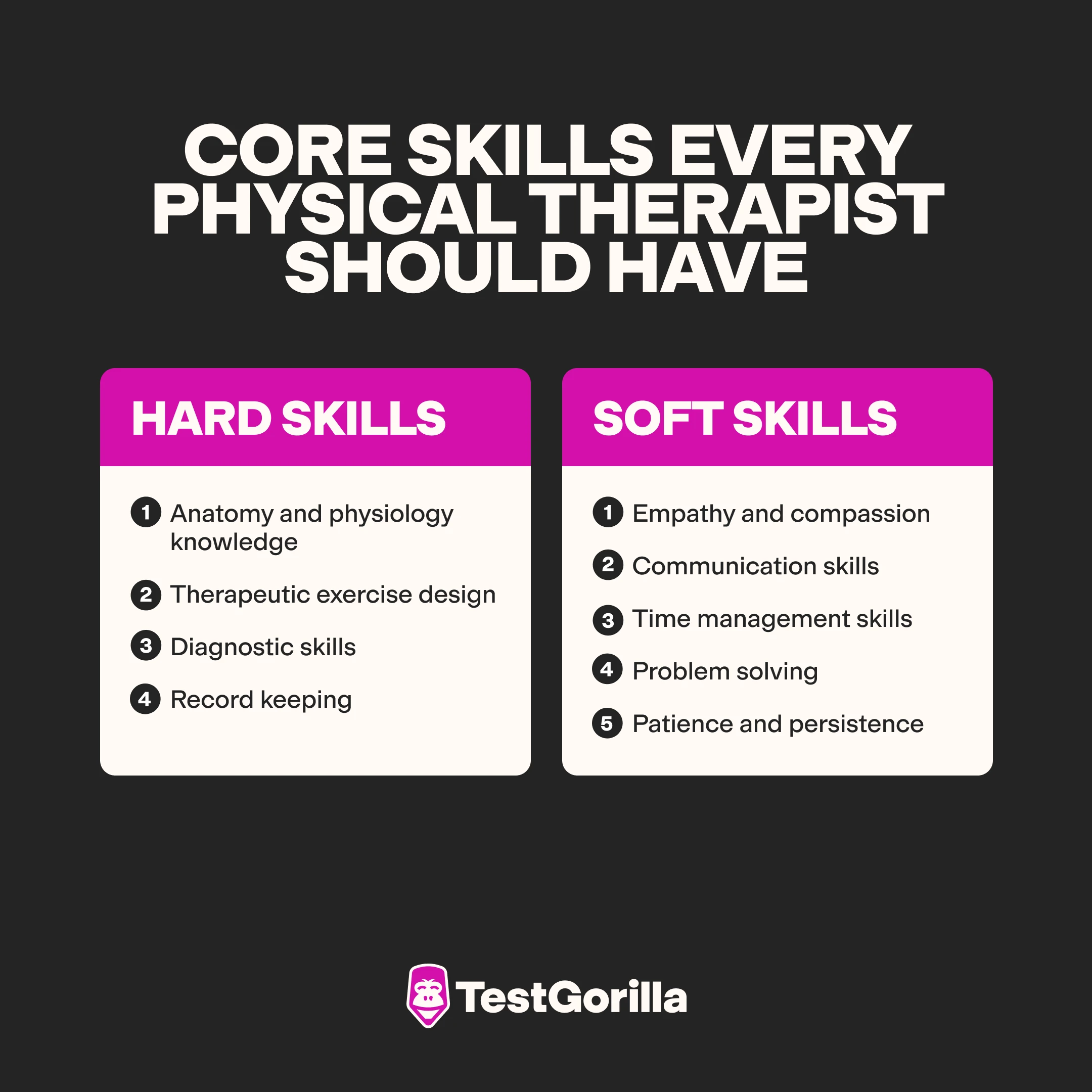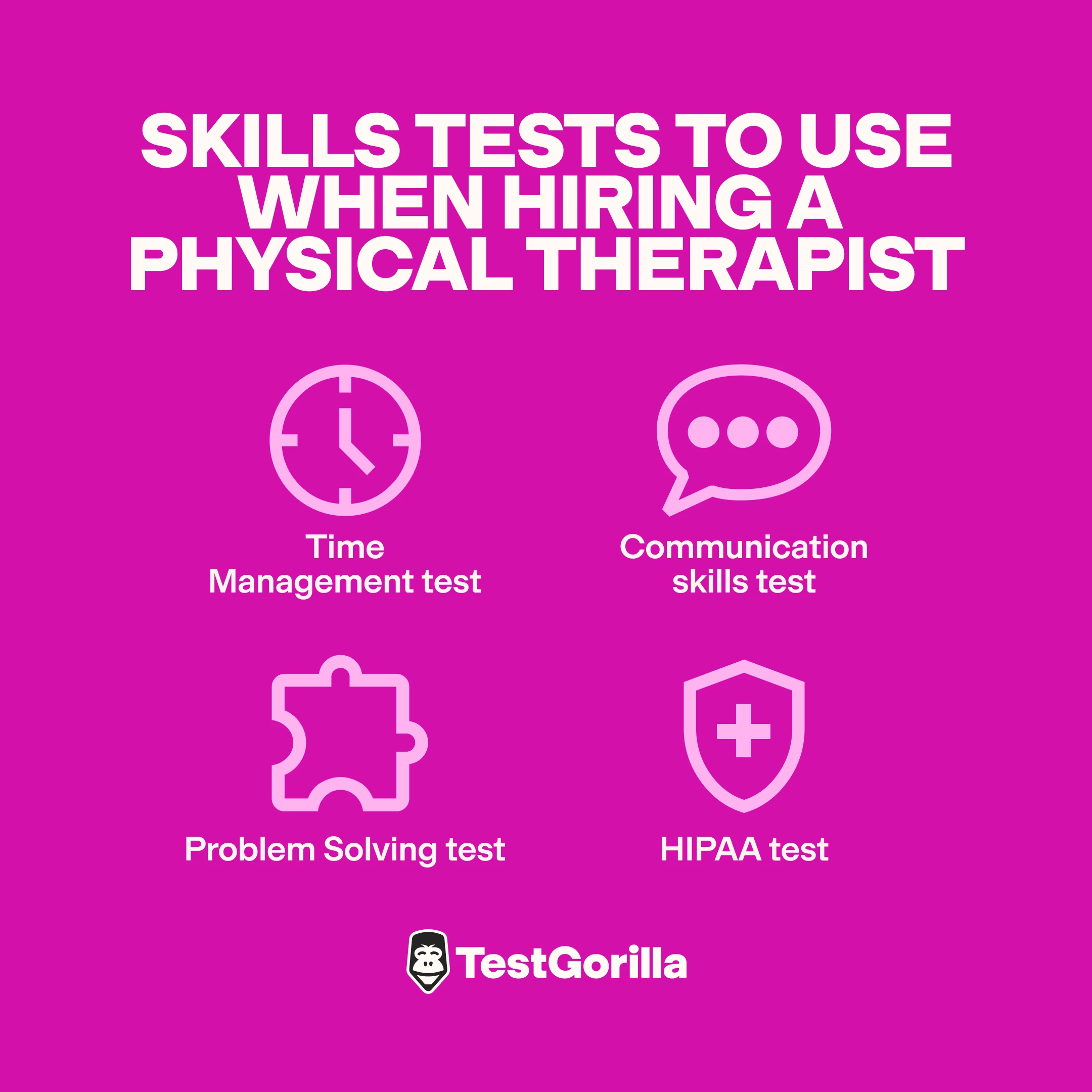A skilled physical therapist can be a game-changer for your clinic – but hiring one isn’t easy.
You need someone who has the technical chops, can build strong patient relationships, and tailors treatments to individual needs. Miss these, and you might end up with a frustrated team and dissatisfied patients. But get it right, and you’ll see improved patient outcomes and a stellar clinic reputation.
Consider this guide your one-stop shop for navigating the hiring process and finding the perfect physical therapist for your team. Let’s dig in!
Table of contents
- What is a physical therapist?
- 9 skills to look for when hiring a physical therapist
- Tips for writing a physical therapist job description
- Where to find a physical therapist for your business
- How to test your future physical therapist’s skills
- Top interview questions for a physical therapist
- Common mistakes to avoid when hiring candidates
- FAQs
- Select the best physical therapists with TestGorilla
What is a physical therapist?
A physical therapist (aka a PT) is a healthcare professional who helps patients reduce pain, improve mobility, and restore function through exercises, manual therapy, patient education, and more.
On a typical day, a PT works with various patients – people recovering from surgeries, athletes needing to get back in the game, or individuals dealing with chronic conditions, such as arthritis or back pain.
9 skills to look for when hiring a physical therapist
Below are nine skills all physical therapists should have.
Hard skills
Anatomy and physiology knowledge. PTs need a solid understanding of the human body and how different systems interact. This is vital for accurately diagnosing issues and creating effective treatment plans.
Therapeutic exercise design. Physical therapists should know how to design and implement exercises tailored to patients’ needs. This way, PTs can help patients regain strength, enhance flexibility, and prevent future injuries.
Diagnostic skills. PTs must be skilled at assessing patient conditions through physical exams, patient histories, and diagnostic tests.
Record keeping. Precise and detailed record-keeping is key in physical therapy. It helps ensure patients get consistent care and keeps your company on the right side of legal requirements.
Soft skills
Empathy and compassion. Physical therapists work with patients who are in pain or facing big changes. Being kind and understanding helps build trust and provides emotional support, making the whole treatment experience better.
Communication skills. Physical therapists need to explain medical information and treatment plans in an easy-to-understand way. They also need to listen to patients' concerns and work together to ensure effective care.
Time management skills. Good time management is essential to handle a busy schedule without compromising care quality. Physical therapists need to seamlessly juggle multiple patients, administrative tasks, and ongoing professional development.
Problem solving. Effective problem-solving skills allow physical therapists to adapt treatment plans, think creatively to overcome challenges, and find the best solutions for each patient’s unique situation. This flexibility is key to successful rehabilitation!
Patience and persistence. Rehabilitation can be a slow process. Physical therapists need patience to support patients through tough times and persistence to keep them motivated. These qualities create a positive environment that boosts patient progress.
Tips for writing a physical therapist job description
Ready to write an awesome physical therapist job description and find your next healthcare superstar? Try following these top tips.
1. Highlight their professional autonomy
Physical therapists do their best work when they have control over their patients’ treatment. So, highlight the autonomy your physical therapists have in creating treatment plans and making clinical decisions. Mention that your clinic takes a 'light touch' approach, stepping in only when absolutely necessary.
2. Emphasize work-life balance
Healthcare professionals often work long hours, so a business that supports work-life balance is really appealing. To make your clinic stand out, emphasize flexible working hours, manageable caseloads, and policies that encourage rest and recovery. Also, mention specific programs or benefits that promote a healthy work-life balance.
3. Mentorship and development
Finally, share information about any mentorship or buddy programs you offer for new hires. Knowing they’ll have guidance and support as they start can be really attractive to candidates, especially recent graduates.
Where to find a physical therapist for your business
You might find a candidate who’s just okay on standard job boards, but you’ll get much better results looking in the following places.
1. Specialized job boards
Specialist health boards like those at Health eCareers, myHealthTalent, and the American College of Healthcare Executives are geared toward health professionals, helping you connect with physical therapist candidates who have the specific skills and experience you need.
You could also try posting your vacancy on more diverse job boards – like TestGorilla’s! Doing so can help you attract a range of experienced physical therapists actively seeking new opportunities.
2. Employee referrals
Encourage your team to refer qualified candidates in exchange for a small bonus or other incentive such as extra time off. Referred employees are more likely to share your values and be a good culture add if they get on with members of your current team. A win-win!
3. Local colleges or universities
If you’re looking for more junior team members, consider contacting local colleges or universities with physical therapy programs. Many schools host job fairs or have career services that can connect you with recent graduates or soon-to-be graduates eager to start their careers.
4. Social media
Don’t discount social media when looking to make your next hire. Social media is full of self-employed physical therapists who may be looking to transition into the stability of employment. Search ‘Physical Therapists + [Your Area]’ on platforms like Instagram and X (Twitter) and see what comes up. Then, reach out to a few professionals via the direct message feature and see if they’d be interested in exploring opportunities with your business.
How to test your future physical therapist’s skills
Knowing the skills to look for in physical therapists is only half the battle. You also need to know how to test them.
Enter talent assessments! They’re a reliable, bias-free way to ensure candidates actually have the skills they need for your open role.
With a talent assessment platform like TestGorilla, you can measure a candidate’s hard skills, soft skills, personality traits, and more – getting a realistic picture of how they'll perform on the job.
TestGorilla enables you to combine up to five tests in one unique assessment. Plus, you can customize test questions, build your own questions, and check candidate scores from anywhere.
When hiring a physical therapist, consider using these:
Time Management test. This test measures how well candidates can plan, prioritize, and execute their tasks – and whether they can reflect on past time management mishaps.
Communication skills test. This assesses a candidate's proficiency in written and verbal communication. It also measures their understanding of professional etiquette and whether they can interpret non-verbal cues.
Problem Solving test. This test measures how well candidates can adjust to a changing schedule, interpret data to make decisions, and draw reasonable conclusions from information.
HIPAA test. This test measures how well a candidate understands healthcare data security through the Health Insurance Portability and Accountability Act (HIPAA). It tests whether they understand HIPAA, how to apply its requirements, and how to prevent its negative consequences.
Top interview questions for a physical therapist
The questions you ask your physical therapist candidates can make or break your hiring process. Here are some top interview questions to help you find the perfect fit for your clinic:
“Can you tell me about a time a client wasn’t sticking to their treatment plan? How did you handle it, and what was the outcome?” This question gives you insights into candidates’ empathy, patience, and ability to motivate and educate patients.
“What’s the most rewarding feedback you’ve ever received from a patient?” With this question, you learn what candidates value most in their work and their dedication to patient care.
“Tell me about a time when a patient's recovery took an unexpected turn. How did you adapt to it, and what was your new treatment plan?” A patient's path to health can be unpredictable, and physical therapists must be adaptable and quick-thinking. This question checks their problem-solving skills and ability to stay calm under pressure. You can also use this question to see if your PT can work well with other professionals, such as recreation or occupational therapists. For more info on these roles, check out our guide to hiring a recreation therapist and our article on hiring an occupational therapist.
“How do you stay updated with the latest advancements in physical therapy?” Continual personal development and lifelong learning are key parts of being a healthcare professional. Candidates should be able to demonstrate how they keep up with new research, techniques, and technologies in the field to ensure they provide the best care possible.
“What techniques do you use to build rapport with new patients?” A candidate’s bedside manner could be the reason you pick them over another applicant. This question helps you understand how they establish trust and a strong therapist-patient relationship.
“How do you manage your time when dealing with a high caseload?” Unfortunately, a high caseload is a common part of being a physical therapist. However, being overworked can lead to mistakes and burnout. This question evaluates candidates’ organizational skills and ability to prioritize tasks effectively to ensure they provide quality care without compromising their well-being.
Common mistakes to avoid when hiring candidates
Watch out for these pitfalls when hiring your next physical therapist.
1. Focusing solely on traditional experience
Don’t get stuck on candidates with only hospital or clinic experience. Those who have worked in sports teams, home health care, or rehabilitation centers often bring unique skills and approaches that can be highly beneficial.
2. Neglecting safeguarding checks
Patient safety should be your top priority, so leave no stone unturned when ensuring candidates have a clean and trustworthy history. Ensure you conduct comprehensive background checks, verify credentials, and follow up on references. This way, you protect your patients and maintain your company’s integrity.
FAQs
How much do physical therapists make?
Physical therapists make an average of $104,624 per year, according to Glassdoor.
Do I need to go to college to be a physical therapist?
Going to college and studying physical therapy is one way to become a physical therapist. But you could also become a physical therapist assistant (PTA) or a physical therapy aid and work your way up.
At some point, you will need specialist qualifications to qualify as a physical therapist. These can be completed through a community college, a university, or other accredited programs.
Is a physical therapist the same as a physiotherapist?
Yes, a physical therapist is the same as a physiotherapist. They’re two names for the same job. “Physical therapist” is typically used in the US, and “physiotherapist” is more commonly used in the UK and Canada.
Select the best physical therapists with TestGorilla
Physical therapists help patients recover from long-term illnesses and injuries. Hiring the right one can improve patient outcomes, bring repeat customers, and make your clinic run smoothly. But with so many exaggerated resumes out there, how can you be sure who you’re hiring?
Enter TestGorilla. Our talent discovery platform offers a library of pre-employment tests, detailed candidate benchmarking, and more so you can easily find the best physical therapists for your team.
But don’t just take our word for it: Schedule a live 45-minute demo or sign up for a free TestGorilla account today!
Related posts
Hire the best candidates with TestGorilla
Create pre-employment assessments in minutes to screen candidates, save time, and hire the best talent.
Latest posts
The best advice in pre-employment testing, in your inbox.
No spam. Unsubscribe at any time.

Hire the best. No bias. No stress.
Our screening tests identify the best candidates and make your hiring decisions faster, easier, and bias-free.
Free resources
This checklist covers key features you should look for when choosing a skills testing platform
This resource will help you develop an onboarding checklist for new hires.
How to assess your candidates' attention to detail.
Learn how to get human resources certified through HRCI or SHRM.
Learn how you can improve the level of talent at your company.
Learn how CapitalT reduced hiring bias with online skills assessments.
Learn how to make the resume process more efficient and more effective.
Improve your hiring strategy with these 7 critical recruitment metrics.
Learn how Sukhi decreased time spent reviewing resumes by 83%!
Hire more efficiently with these hacks that 99% of recruiters aren't using.
Make a business case for diversity and inclusion initiatives with this data.



















